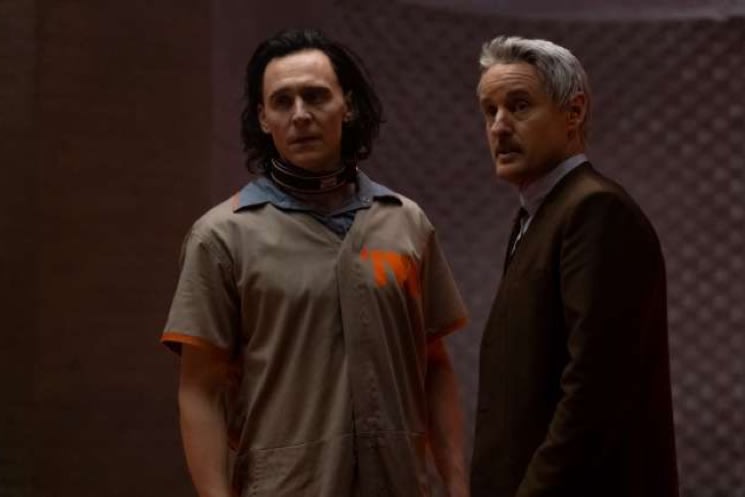One of the smartest decisions Marvel ever made was realizing that Thor was absurd and ought to be a comedy. It's impossible to take the mythic god Thor and his mischievous brother Loki seriously — so it's a good thing that Loki, the MCU's latest Disney+ series, is mostly just for laughs. Owen Wilson's character Mobius M. Mobius says it himself in the show's second episode: "Odin, God of the Heavens. Asgard, mystical realm beyond the stars. Frost Giants. Listen to yourself! If you think too hard about where any of us came from, who we truly are, it sounds kind of ridiculous. Existence is chaos. Nothing makes any sense!"
Loki begins with our titular antihero getting imprisoned by the Time Variance Authority (TVA) — a bureaucracy with agents responsible for unifying the multiverse into one sacred timeline — for causing a Tesseract-related tear in the space-time continuum. After getting shuffled between various paper-pushing members of middle management, Owen Wilson's Mobius enlists Loki (Tom Hiddleston) to hunt down a dangerous "variant" who has broken free from the one true timeline and is travelling through history causing havoc. That variant just so happens to be an alternate-timeline version of Loki himself.
The first episode plays out a little too much like Terry Gilliam's Brazil, with retro sci-fi technology, brutalist architecture and curmudgeonly grumbling about how annoying it is to jump through bureaucratic hoops. With talk of Tesseracts, Infinity Stones and the Avengers, it leans heavily on MCU lore without sufficiently laying out what will set Loki apart.
Things get going in the second episode, thankfully, as the TVA casually discuss a series of apocalyptic events in the 2040s and 2050s in a way that's both funny and distinctly sinister. Hiddleston expertly plays Loki as hapless one minute and callously calculating the next, while Owen Wilson delivers a quintessentially Owen Wilson-y performance. Wow. His ineffectual indignation is particularly perfect when in a scene in which Loki ruins the salad he's eating for lunch.
Loki certainly isn't shaping up to most monumental Marvel property yet, and it doesn't reinvent the medium like WandaVision, but the two episodes available to critics offer some solid MCU comedy while also giving a dark glimpse into the suffering throughout human history and the dystopian disasters that likely await us in the 21st century.
(Disney)Loki begins with our titular antihero getting imprisoned by the Time Variance Authority (TVA) — a bureaucracy with agents responsible for unifying the multiverse into one sacred timeline — for causing a Tesseract-related tear in the space-time continuum. After getting shuffled between various paper-pushing members of middle management, Owen Wilson's Mobius enlists Loki (Tom Hiddleston) to hunt down a dangerous "variant" who has broken free from the one true timeline and is travelling through history causing havoc. That variant just so happens to be an alternate-timeline version of Loki himself.
The first episode plays out a little too much like Terry Gilliam's Brazil, with retro sci-fi technology, brutalist architecture and curmudgeonly grumbling about how annoying it is to jump through bureaucratic hoops. With talk of Tesseracts, Infinity Stones and the Avengers, it leans heavily on MCU lore without sufficiently laying out what will set Loki apart.
Things get going in the second episode, thankfully, as the TVA casually discuss a series of apocalyptic events in the 2040s and 2050s in a way that's both funny and distinctly sinister. Hiddleston expertly plays Loki as hapless one minute and callously calculating the next, while Owen Wilson delivers a quintessentially Owen Wilson-y performance. Wow. His ineffectual indignation is particularly perfect when in a scene in which Loki ruins the salad he's eating for lunch.
Loki certainly isn't shaping up to most monumental Marvel property yet, and it doesn't reinvent the medium like WandaVision, but the two episodes available to critics offer some solid MCU comedy while also giving a dark glimpse into the suffering throughout human history and the dystopian disasters that likely await us in the 21st century.
